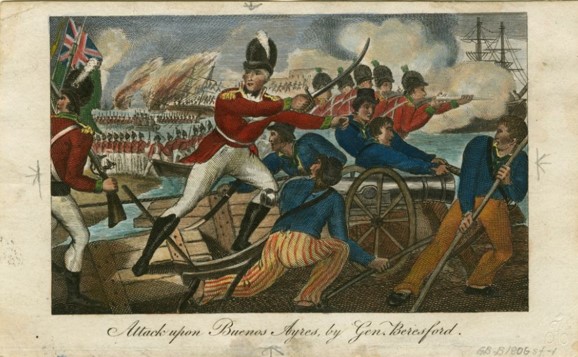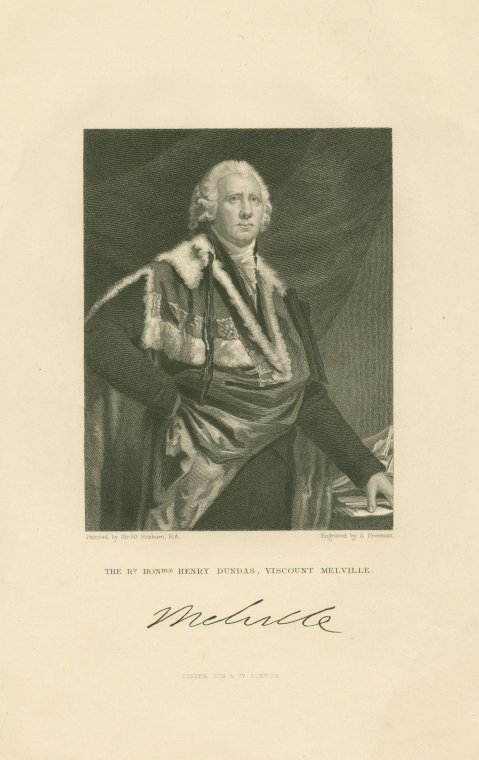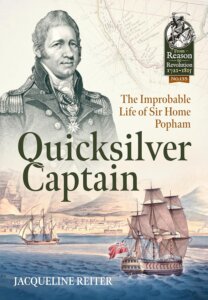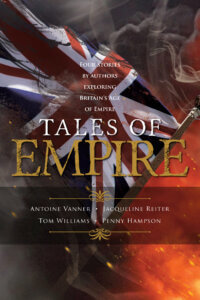Next week (1st to 5th October) Tales of Empire – four short stories by four historical fiction authors – will be FREE on Amazon. One of those authors is Jacqueline Reiter who dabbles in fiction but whose main writing efforts are impressive works of historical non-fiction. The latest is Quicksilver Captain, her biography of the man famous for developing the flag code used by Nelson at Trafalgar (“England expects that every man will do his duty”). Arguably, he was responsible for the British invasion of Buenos Aires that features in my book, Burke in the Land of Silver. He did much, much more in his remarkable life and I’m delighted to host Dr Reiter to introduce him on my blog.
Quicksilver Captain
Quicksilver Captain: The improbable life of Sir Home Popham is about one of the more under-appreciated characters of the French Revolutionary and Napoleonic Wars. Popham (1762–1820) was a Royal Navy captain for most of the period, the era of Jack Aubrey and Horatio Hornblower. In contrast to his fictional counterparts, however, Popham’s real-life exploits were almost too strange – too improbable –for a novel.

Popham is best known as a scientific officer who invented the naval signal code used by Lord Nelson at the Battle of Trafalgar, and as the instigator of the British invasion of Buenos Aires in 1806 (he appears in Tom Williams’s Burke in the Land of Silver, which uses this campaign as a backdrop). But Popham first came to prominence helping the British army evacuate from Germany in 1795, where it had been abandoned by its allies and was being hounded by the French. This made Popham’s reputation as an expert in amphibious operations and got him promoted to post-captain through the personal intercession of the army’s commander, the Duke of York. This did not make Popham popular in his own profession: his Navy peers always considered him, to quote my book, “as a charlatan who had got lucky with the Army”. [1] He didn’t care. His exploits in Flanders allowed him to stand out from the crowd of other post-captains looking for employment, and he usually took on the trickier, often dirtier, jobs nobody else wanted to do. He was, as one military man put it, ‘very useful upon all occasions and in all ways’. [2]

Popham was much more than just a ship’s captain – in fact the one place he was almost certain not to be, throughout his career, was aboard his own ship. He acted as an agent for transports, a diplomat, an intelligence officer, a Member of Parliament, a hydrographer, a scientist and inventor, a publicist, and a government adviser. He muscled himself into the trust of some of Britain’s most prominent politicians, including prime minister William Pitt and Secretary of State for War Henry Dundas. Despite only being a post-captain for most of the wars with France, his political contacts meant he punched well above his weight: he influenced several important British campaigns all over the world, not just at Buenos Aires but in Europe, the Middle East, the Indian Ocean, and Africa.
Britain, with its nascent empire, had trade networks and military concerns all over the world, and much of British strategy revolved around protecting its colonies and securing strategic naval stations – as well as destroying, or more preferably capturing, those of the enemy. The foremost proponent of this ‘blue-water’ strategy during the wars was Popham’s main patron, Henry Dundas, First Viscount Melville, who believed ‘It is … as much the duty of those entrusted with the conduct of a British war to cut off the colonial resources of the enemy, as it would be that of the general of a great army to destroy or intercept the magazines of his opponent. … Exertions of that nature ought to admit of no limitation’. [3] Popham wholeheartedly agreed. Fuelled by ambition and supreme self-confidence, he became very good at shaping his ideas to suit the inclinations of the politicians – in other words, at telling his patrons what they wanted to hear.

Popham’s career involved taking risks and pushing boundaries, which often led to controversy (as at Buenos Aires), and his schemes were not always successful. His reputation was mixed in his own lifetime: he was described by one disapproving contemporary as a kind of ‘Naval Quack’. [4] Historians have mostly agreed with this; the most recent assessment of his career described him as ‘a gambler … a fiddler, a filibuster, a raider, a buccaneer and a freebooter’. [5] It did not help that Popham had once run his own smuggling vessel, and his exploits at Buenos Aires, which led to his court-martial, did not help. Still, Popham should not be dismissed so lightly. His rollercoaster career shows how one man could help shape an unfocused, but dynamic, British strategy during the wars against Napoleonic France. I definitely found Quicksilver Captain a story worth telling – and I hope readers will agree.
Notes
[1] Jacqueline Reiter, Quicksilver Captain: The improbable life of Sir Home Popham (Warwick: Helion & Co., 2024), p. 233
[2] Francis Culling Carr-Gomm (ed.), Letters and Journals of Field-Marshal Sir William Maynard Gomm, GCB … (London: John Murray, 1881), pp. 131–132
[3] Speech by Henry Dundas, 25 March 1801, as reported in William Cobbett, Parliamentary History of England … to 1803 … (London, 1819), vol. 35,cols. 1072–1073
[4] The British Library G.19449, p. xxv: marginal comment by Benjamin Tucker in his copy of A Full and Correct Report of the Trial of Sir Home Popham (London: J. and J. Richardson, 1807)
[5] Chris Coelho, ‘The Popham Code Controversy’, in J.E. Pearson, S. Heuvel, and J. Rodgaard (eds), The Trafalgar Chronicle: New Series 5 (Barnsley: Seaforth Publications), pp. 133–147, p. 133
Picture credits
Sir Home Popham, by Anthony Cardon after Mather Brown, 1807 (Public domain, Yale Center for British Art, Paul Mellon Collection)
Attack upon Buenos Aires by General Beresford, engraver unknown, 1806 (Public domain, Anne S.K. Brown Military Collection, Brown University Library)
Henry Dundas, Viscount Melville, by R. Freeman after Henry Raeburn (Public domain, The Miriam and Ira D. Wallach Division of Art, Prints and Photographs, The New York Public Library)
Further reading
Hugh Popham, A Damned Cunning Fellow: The Eventful Life of Rear Admiral Sir Home Popham KCB, KCH, KM, FRS 1762–1820 (Tywardreath: Old Ferry Press, 1991)

About Jacqueline Reiter
Jacqueline Reiter received her PhD from the University of Cambridge in 2006. Her first book, The Late Lord: the Life of John Pitt, 2nd Earl of Chatham (Pen and Sword, 2017), illuminated the career of Pitt the Younger’s elder brother. Her articles have appeared in History Today and the Journal of the Society for Army Historical Research; she has written for the History of Parliament and co-written a chapter with John Bew on British war aims for the Cambridge History of the Napoleonic Wars. Her latest book, Quicksilver Captain: The Improbable Life of Sir Home Popham, is published by Helion.
Tales of Empire
Tales of Empire is free on Kindle next week (1 – 5 October). Here’s why you should grab a copy.

Tales of Empire is a book of short stories. There are only four, which is why even when you have to pay for it, it costs only 99p. The four showcase the work of four very different but uniformly excellent historical fiction writers. (Well, three excellent writers plus me.)
The authors were asked to submit a story set anywhere from the end of the Napoleonic Wars to the end of the century. Although they all write conventional historical fiction with no revisionist agenda, all four stories ended up challenging some of the more traditional approaches to Empire.
Explore a new take on Empire with this free book.
